Posts Tagged ‘Human Rights Violations’ (349 found)
The FCO’s Human Rights Work 2013
In this report, we examine the 2013 Foreign and Commonwealth Office (FCO) Report on Human Rights and Democracy (2013 Report), and highlight some areas of particular concern. Promoting human rights should be a foreign policy priority, but for this to be meaningful, we believe that the Department would benefit from the establishment of clearly defined objectives and benchmarks to measure the outcomes of all of its human rights policies, and further prominence being given to these in the Report.
Countries of concern
The FCO designated 28 countries of concern in its 2013 report, where it judged the gravity of the human rights abuses to be so severe that a particular focus should be applied. We have concentrated our attention on three of these countries: Sri Lanka, Burma, and Israel and the Occupied Palestinian Territories. Favourable trade concessions to the EU market should be removed from Sri Lanka if the Government of Sri Lanka continues to deny the OHCHR investigation team access into the country. The Government should advocate re-imposition of sanctions by the EU if there is no improvement in the human rights situation in Burma. The human rights of Israeli, Palestinian and Bedouin citizens living in Israel and the Occupied Palestinian Territories continue to be of serious concern to the UK. […]
• • •Myanmar: Serious Risk of Further Human Rights Abuses at Controversial Letpadaung Mine
Two years after police used incendiary weapons against monks and villagers protesting a mining project in central Myanmar, no one has been held accountable, Amnesty International said ahead of the anniversary of the attack. […]
• • •Constitutional Stalemate Sinks Hopes of Genuine Democracy and National Reconciliation
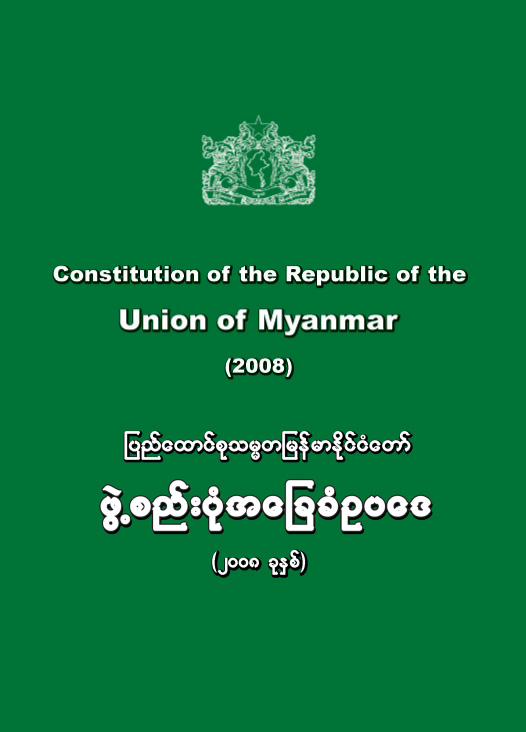 On Tuesday 18 November, Parliamentary Speaker of the lower house of the Burma Parliament Thura Shwe Mann boldly announced – to everyone’s great frustration but no one’s great surprise – that there would be no amendments made to the controversial 2008 Constitution before the 2015 national elections. So, what are the implications of this announcement, and why is the timing significant?
On Tuesday 18 November, Parliamentary Speaker of the lower house of the Burma Parliament Thura Shwe Mann boldly announced – to everyone’s great frustration but no one’s great surprise – that there would be no amendments made to the controversial 2008 Constitution before the 2015 national elections. So, what are the implications of this announcement, and why is the timing significant?
The implications for democracy in Burma are threefold. First, unless Article 59(f) is amended, Daw Aung San Suu Kyi will not be able to lead her NLD party and run for President in the 2015 elections. Although many have long feared the worst, thus far hope has persisted, especially in light of the NLD’s highly successful campaign in favor of constitutional amendment, which attracted five million signatories in support. However, Thura Shwe Mann now seems to be calling time on Daw Aung San Suu Kyi’s political career – and the dreams of so many long-suffering and long-hopeful Burmese – smoothly but ruthlessly side-lining her until such time as she can safely be labeled a political irrelevance, and dumped for good. At the same time, his comments can be interpreted as an oblique, discreet and wily announcement of his own ambitions for a tilt at the presidency next year.
Second, without a significant overhaul of the 2008 Constitution to ensure that the rights, autonomy and self-determination of ethnic minority nationalities are respected and enshrined in law, the peace process does not stand a chance. Fighting rages on in Kachin State – not to mention in northern Shan and Karen State – with no sign of abating. The day after Thura Shwe Mann made his announcement, 23 Kachin and other ethnic nationality soldiers were killed and as many as 15 wounded when Burma Army troops fired on a military training base in Laiza, the strategic headquarters of the Kachin Independence Army. […]
• • •‘If they had hope, they would speak’: The Ongoing Use of State-Sponsored Sexual Violence in Burma’s Ethnic Communities
In January 2014, the Women’s League of Burma (WLB) published a report which demonstrated the systematic use of rape by the Burma Army as a strategy to subjugate communities across the country. We documented over a hundred cases of sexual violence in the years since President Thein Sein took office – a number which we believe grossly underestimates the true scale of the problem. Drawing on evidence gathered by our member organisations across Burma, we argued that there are clear links between militarisation, investment and human rights abuses. We also proposed a number of steps to uproot the culture of impunity which surrounds sexual violence, and prevents survivors from obtaining justice. Whilst recent months have seen positive action taken in several areas, the pillars which provide impunity for perpetrators of human rights abuses remain in place. In January, we called for constitutional reform to place the military under civilian control; the establishment of effective judicial and non-judicial mechanisms to investigate human rights abuses, particularly those relating to sexual violence, and; greater participation of women in the peace process dialogue. […]
• • •British Government Still In Denial About Reality Of Burma Reforms
Following a debate on human rights in Burma in the British Parliament yesterday evening, Burma Campaign UK today accused the British government of being in denial about the reality of the reform process in Burma. Burma Campaign UK called on the British government to formally accept that the reform process in Burma has stalled, that the process is not a transition to democracy, and to change policy accordingly. […]
• • •International Community Silent on New Rohingya Crackdown
International Community Silent on New Rohingya Crackdown Burmese Rohingya Organisation UK today called on the international community to end its silence over a new wave of repression against the Rohingya which began in September. […]
• • •A Foreseeable Disaster in Burma: Forced Displacement in the Thilawa Special Economic Zone
Recent liberalization of some governmental policies in Burma (officially the Union of Myanmar) has led to the lifting of a number of bilateral sanctions and increases in foreign aid and investment. Both governments and corporations are entering into partnerships with Burmese companies to undertake major development projects, including building special economic zones (SEZ), developing hydroelectric dams, signing concession agreements for mining operations, and building pipelines. Despite their potential to create opportunities for economic advancement, such development projects are causing widespread forced displacement throughout the country, undermining the human rights of the people living in affected areas.
Forced displacement threatens people on every continent. Environmental degradation, conflict, the race for scarce resources, development projects, and land grabs have caused a significant number of these illegal displacements. People living in marginalized communities, including ethnic minorities and indigenous groups, are particularly vulnerable to forced displacement. […]
• • •Statement by Shan Community Based Organizations (CBOs) to US President Barack Obama
We, Shan community based organisations, deplore the large-scale offensive that the Burma Army has been conducting in central Shan State since June 2014, which is in violation of an existing ceasefire agreement and completely negates the Burmese government’s claims to be building nationwide peace. We urge President Obama to publicly raise concerns about this offensive with President Thein Sein during his visit to Naypyidaw, and to call for the Burmese government to immediately end its military operations and begin political dialogue to end the civil war. […]
• • •Impunity for Military Abuses Has to End
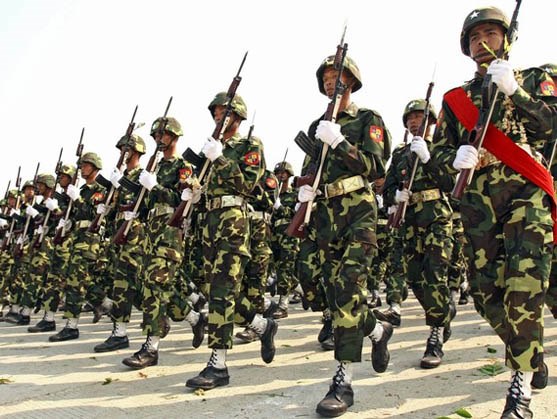 On 7 November, the International Human Rights Clinic (the Clinic) at Harvard Law School published a Legal Memorandum which establishes that certain Burma Army commanders are guilty of crimes against humanity and war crimes under international criminal law. The Legal Memorandum submits its findings on the basis of a three-year investigation (the Investigation) into human rights abuses associated with a Burma Army offensive in Karen State, which was launched in late 2005 and continued into 2008 (the Offensive). The Clinic chose this offensive “because it was one of the largest in recent memory and was widely condemned by the international community.” The Investigation focused specifically on the conduct of two military units – Southern Regional Military Command (SRMC) and Light Infantry Division 66 (LID 66) – in Thandaung Township, Karen State.
On 7 November, the International Human Rights Clinic (the Clinic) at Harvard Law School published a Legal Memorandum which establishes that certain Burma Army commanders are guilty of crimes against humanity and war crimes under international criminal law. The Legal Memorandum submits its findings on the basis of a three-year investigation (the Investigation) into human rights abuses associated with a Burma Army offensive in Karen State, which was launched in late 2005 and continued into 2008 (the Offensive). The Clinic chose this offensive “because it was one of the largest in recent memory and was widely condemned by the international community.” The Investigation focused specifically on the conduct of two military units – Southern Regional Military Command (SRMC) and Light Infantry Division 66 (LID 66) – in Thandaung Township, Karen State.
Articles 7 and 8 of the Rome Statute of the International Criminal Court (ICC) set out the legal requirements for an action to qualify as a “crime against humanity” or a “war crime,” respectively. The essence of a “crime against humanity” is that the act in question should be “part of a widespread and systematic attack directed against any civilian population, with knowledge of the attack.” Similarly, Article 8 stipulates that a “war crime” must be committed “as part of a plan or policy or as part of a large-scale commission of such crimes,” and must constitute a grave breach of the Geneva Conventions 1949, which regulate the conduct of armed conflict […]
• • •Burma: Religious Freedom and Related Human Rights Violations are Hindering Broader Reforms
The dramatic political developments in Burma in recent years are of historical and geopolitical significance. Bur-ma has progressed much further than most might have imagined possible only a few short years ago. Despite these achievements, Burma still has a long journey along the road to democracy and respect for human rights. Serious violations of religious freedom and human rights continue, accompanied by disturbing evidence of prejudice and intolerance, trends that will inevitably and dramatically impact the prospects for a brighter future. In short, the political reform process in Burma is at great risk of deteriorating if religious freedom and the right to equal treatment under the law are not honored and protected. […]
• • •
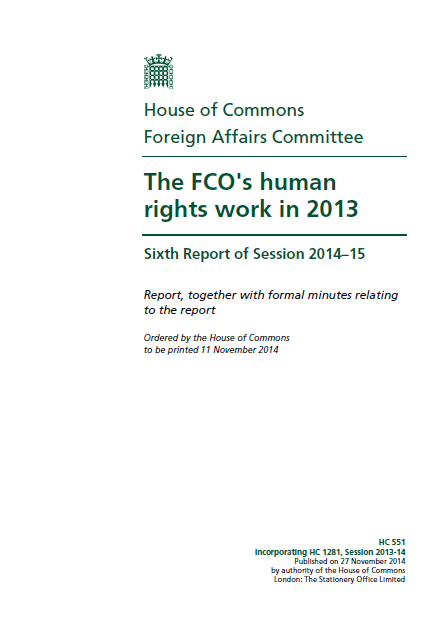

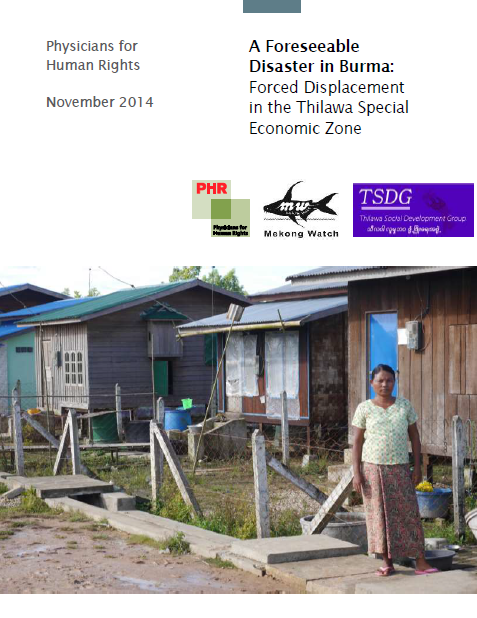
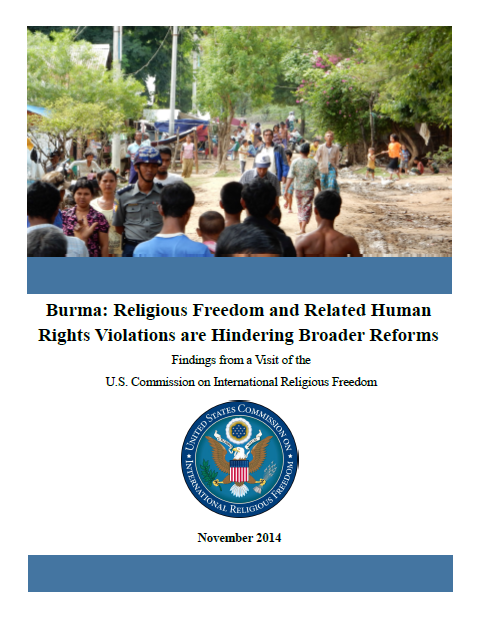








 All posts
All posts